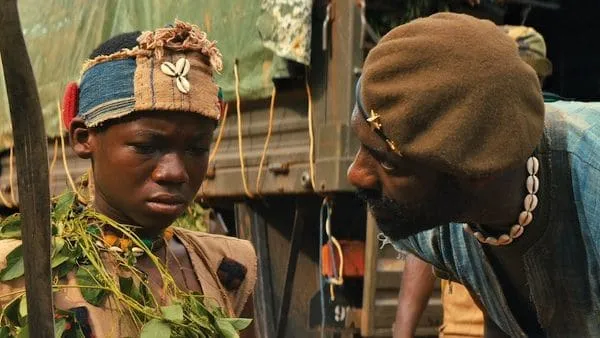Eye For Film >> Movies >> Beasts Of No Nation (2015) Film Review
Beasts Of No Nation
Reviewed by: Owen Van Spall

Cary Joji Fukunaga’s (Jane Eyre, Sin Nombre) adaptation of Uzodinma Iweala’s 2005 novel of the same name (itself borrowed from Fela Kuti’s 1989 album) tackles the exploitation of child soldiers head-on with an unrelentingly grim depiction of modern-day warfare, backed by the sort of punchy visuals that Fukunaga brought to his run on the acclaimed first season of HBO’s True Detective. In fact, this really is something to be seen on the big screen, which is strangely where it won’t be appreciated by its target audience, given this is a Netflix original film. Determined to make sure its move into original cinema makes waves, Netflix has not only secured the services of the hot-right-now Fukunaga (and seems to have given him a sizeable budget) but it has compelling support from Idris Elba as a chillingly brutal warlord wreaking havoc in Africa. The result is a gripping, disturbing experience, though one which risks numbing as much as it informs or shocks viewers.
Newcomer Abraham Attah impresses immediately as young Agu; our eyes into this conflict. A civil war is taking place in an unnamed African country, unnamed presumably so as to generalise the experience, or maybe to give the proceedings an unreal edge. Agu is a charmingly feisty young boy growing up in a UN-protected buffer zone, while outside the shielded area trouble rages. His father works helping refugees settle, while he and his brothers seem to view the conflict as a distant event not worth worrying over, they spend their days eyeing girls and causing havoc. Only a few radio broadcasts suggest things are about to change. Attah is suitably energetic and cheeky in these early scenes, later on he is called upon to shed this naivety slowly as he ages in the face of the horrors he bears witness to and partakes in. It is a tough line to walk, but the young actor manages it well.

Before long, Agu is witnessing unspeakable atrocities, as government-backed forces execute his father and older brother during a military raid on their village, believing them to be agents of a rebel group. Fukunaga certainly knows how to craft an immersive, viscerally impactful combat sequence, with one scene where Agu and his family huddle in a flimsy bunker particularly effective in its use of the claustrophobic setting and the potent sound mix. The post-Saving Private Ryan war film aesthetic is alive and well, punched up by Fukunaga’s preference for an intensely coloured visual palette and immersive HD hand-held camerawork.
When a dazed and traumatised Agu is later discovered by another group of rebel soldiers and is swiftly incorporated into their ranks, Fukunaga's heightened, admittedly beautifying aesthetic works better, as it moves the boy’s experience more into the realms of the hallucinatory. This is appropriate given that Agu’s new leader - The Commandant (Idris Elba), keeps his militia in a sort of state of bizarre ecstasy via threats, chants and narcotics as they rampage around in service of an unseen “Supremo Commander”. Given we are mostly seeing things from Agu’s POV, it is rarely clear to us what any of this fighting is really for.
Idris Elba gives a suitably unhinged performance as the Commandant, playing him like a hellish mix of Colonel Kurtz and Che, a swaggering, crazily dressed figure who uses a variety of means to keep his troops angry, frightened and compliant. His battalion are garlanded with a variety of colourful outfits and banners, and their weapons appear to be from at least five different decades of war. He blends mysterious religious ceremonies into his troop’s training and, in combat, he whips them up into a strange frenzy - their attack runs end up coming off more like protest marches where there seems little thought to given complex tactics.
We are soon disabused of the notion that the Commandant is some kind of idealist - he is in fact cunningly predatory, seeing in Agu, like presumably he has seen in his other young soldiers, that a boy with no family and a simple hunger for vengeance will make the most committed of soldiers. Sexual abuse is also strongly suggested in one ambiguous scene. And, especially as the battalion’s fate takes a turn for the worse, drugs are always on hand to help keep the troops too stoned to either run away or turn on their commander. Agu is forced to undergo the most twisted of coming of age rites under the Commandant’s watch; including a machete killing.
Beats of No Nation certainly has an admirable desire at its heart to remind us of the many childhoods destroyed in war zones, and a willingness to take an unflinching look at the harrowing things these exploited children have to do; Agu is not just a silent witness here. Technically the film is slick, the vibrant and diverse landscapes well-used with a widescreen-sized epic feel to things, and the cinematography (shot by Fukunaga himself) is never less than eye-catching whether we are being exposed to sudden whip cracks of bullets through high grass or a jarring nighttime helicopter rocket attack. But, after two hours of showing us horrific but strangely beautiful war-making, the film starts to feel like it is offering immersion rather than insight, especially as there is little time left to explore what happens after the shooting stops.
Reviewed on: 27 Oct 2015If you like this, try:
Children Of The CongoThe Devil Came On Horseback
The Other Side Of The Country
War Child
War Witch

















